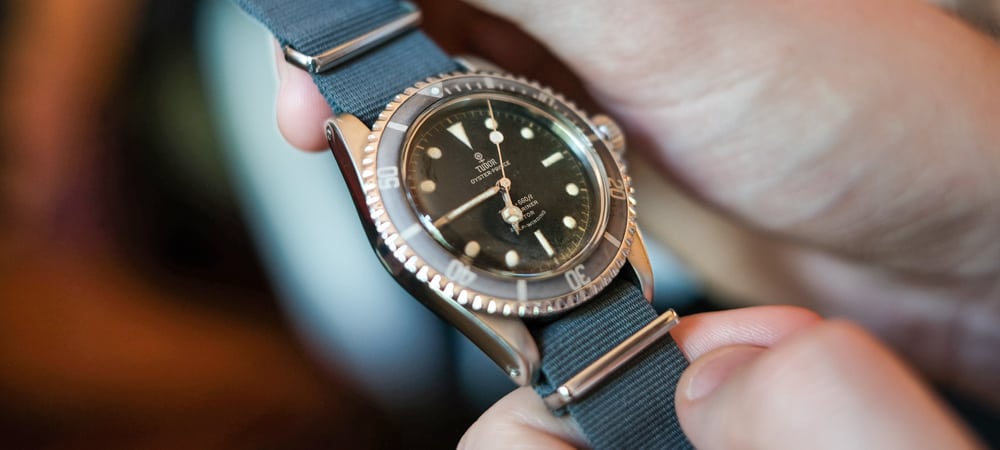Age improves many things. Men, wine (sometimes), cars and most definitely watches. It’s the primary reason why every watch brand’s R&D department spends half its time covered in book dust down in the archives in an attempt to find the most obscure reference to reissue.
Vintage watches are comforting, they hark back to simpler times and, in terms of sales, they are gold. However, what this heritage reissue revival has also triggered is an interest in seeking out vintage designs – the originals that inspired the latest crop. Smart watch buyers are zeroing in on a decade with an aesthetic that appeals and investing there, lured by the bargains to be had.
Although there may be deals and steals, buying vintage can be a bit of a wild west. So, we’re here to go first through the double doors of that particular saloon to let you know where any dangers lie.

Why Would You Buy A Vintage Watch?
There are so many bright, shiny timepieces out there that you can buy from reputable retailers, that still have all their papers and that you know have all their original parts, so why buy vintage?
“In the same way that vintage car collectors may drive a modern one but collect vintage, the same is often true of watches,” says Adrian Hailwood, senior watch specialist at leading UK auctioneer Dreweatts and a private watch consultant and valuer. “A vintage watch may not have the same toughness, accuracy or reliability as a modern one and it certainly won’t be covered by a three- or five-year warranty but it has history and reflects the development of watchmaking over the years.”
If you read up on the watch you want and trust your seller as well, it is also a way to buy into an iconic brand model at a substantially lower price bracket than if you bought new.
For example, as Chris Mann, host of popular watch podcast Time 4 A Pint points out, an Omega Speedmaster from the 1980s or 1990s is a bargains at auction and you can pick up the head (i.e. no bracelet) of an iconic ref.145.022 (the first Speedie to use the calibre 861 and the pre-Moon watch) from back in 1968 for around £2,000-£3,000. Although you can find them listed for £13,000, so it pays to be savvy.

The Best Vintage Watch Sites
Hodinkee
What started out as a blog has now developed into a one-stop shop for all things watch related, and that includes vintage watches. There’s a great selection from the things you know – Rolex Datejusts – to those you might not – 1970s Aquadive Caribbean, anyone?
All the vintage styles are covered by a 30-day mechanical warranty, so if it stops working within that period you can send it back, however, although Hodinkee check the watch is working when it leaves them, they make no guarantee of accuracy or water resistance.

The Watch Club
Set up in 1996 by Daniel Pizzigoni, the Watch Club is where you go when you want something special. It specialises in Rolex and Patek Philippe but there’s still lots to choose from including Tudor, Omega and even relative newbies Bremont.
The catalogue covers everything from recent – a 2017 Nautilius or a 2018 Speedmaster – to rare finds such as a 1948 Breitling Duograph “Rattrapante” in incredible condition. Every watch is covered by a two-year warranty, is inspected by a qualified watchmaker and if necessary serviced and then pressure-tested and accuracy checked onsite.

Watches of Knightsbridge
If you want to take your chances with the auctioneer’s hammer, then this family-run site will add a frisson of excitement to your vintage watch purchasing. Led by father-and-son team Simon and Toby Sutton, they bring 50 years of experience to the vintage watch game. You can flirt with the monthly online auction or attend one of their Berkeley Hotel-based physical events.
As this is an auction house, unless there is a problem, there are no refunds here. When it comes to dials, they are only believed to be original if stated in the condition report, but WoK will not speculate as to the originality of the hands, lume on dials or hands or the originality of polishing on cases.
Every watch worth over £1,000 is also given a due-diligence service by the Art Loss Register, the world’s largest database of lost and stolen watches as well as art, antiquities, and collectibles. This is to determine if it has been stolen before being offered at auction.


Families Of Watches Worth Investing In
“The most important thing is to get away from the word investment [sorry],” says Hailwood. “This suggests that you should only consider watches that may go up in monetary value …at some stage …maybe. Approaching watch collecting like this can suck all the joy out of it as you can only buy what someone else will want to buy from you later on.”
However, if you are buying with one eye on a future prize then there are some parameters. Firstly, in terms of type of watch then you can’t go wrong with tool watches – divers, chronographs, mil-spec (if you’re very lucky to spot one) and pilot’s watches. They remain interesting, so you’re looking at IWC on the pilot’s front, a Jaeger-LeCoultre diver or something a bit off piste, such as the Universal Geneve Tri-Compax chronograph.
If you have big bucks to spend and want a substantial ROI then you can’t beat Rolex or Patek Philippe. “Unlike most high-end luxury watches which may well retain their value and quality over time, many releases from these two industry leaders appreciate in value considerably, and fluctuations in the market often see their value rocket well above expectations,” says Joe McKenzie the founder and CEO of Xupes, a pre-owned and vintage luxury retailer.
And these aren’t the only two. “Omega, Cartier and Breitling could be comfortably added to this list, with returns of around 50% across 10 years expected for certain models among their ranges.”
If you want to buy a name but don’t have that kind of money to throw around though, Hailwood has some fantastic advice: “If money is tight, look for brands who’s profile was once high but now are producing more commercial watches, the likes of Longines and Tissot are good examples.”

Vintage Watch Buying Dos and Dont’s
Do
Buy the best condition, most original example of your chosen watch that you can afford. As Hailwood says, “if necessary, buy a great example of a cheaper watch rather than a wreck from a prestige brand.”
Research the seller, checking third-party online reviews, such as TrustPilot, and getting feedback from forums as well to reassure you that the seller is honest and genuine, says McKenzie.
Read everything you can about the watch you want to buy. Some styles, such as a Rolex Submariner or Omega Speedmaster, have such model-specific historical details like different hand styles or dial materials that only by researching will you know if they’ve been changed at some point in its history.
Don’t
“Buy complications unless you have deep pockets,” says Hailwood. “They can be expensive to fix or service, so stay to time-only and pay close attention to the dial. Movements can be fixed, but a stained or damaged dial is often a write-off.”
Be afraid to ask questions, especially when buying from specialist auction houses. “Watches are often sold ‘as is’ and while defects should not be hidden, you may need to read all the supplied information to reveal them,” says Hailwood.
Always expect boxes and papers. Although they do help reinforce a watch’s value and are a must for those buying a key reference as an investment, they are not going to come with every watch. Something from near 50 years ago, will invariably not have these and that doesn’t make it dodgy. However, if there is a box ensure it is the right one or at least from the same period in the brand’s history.







